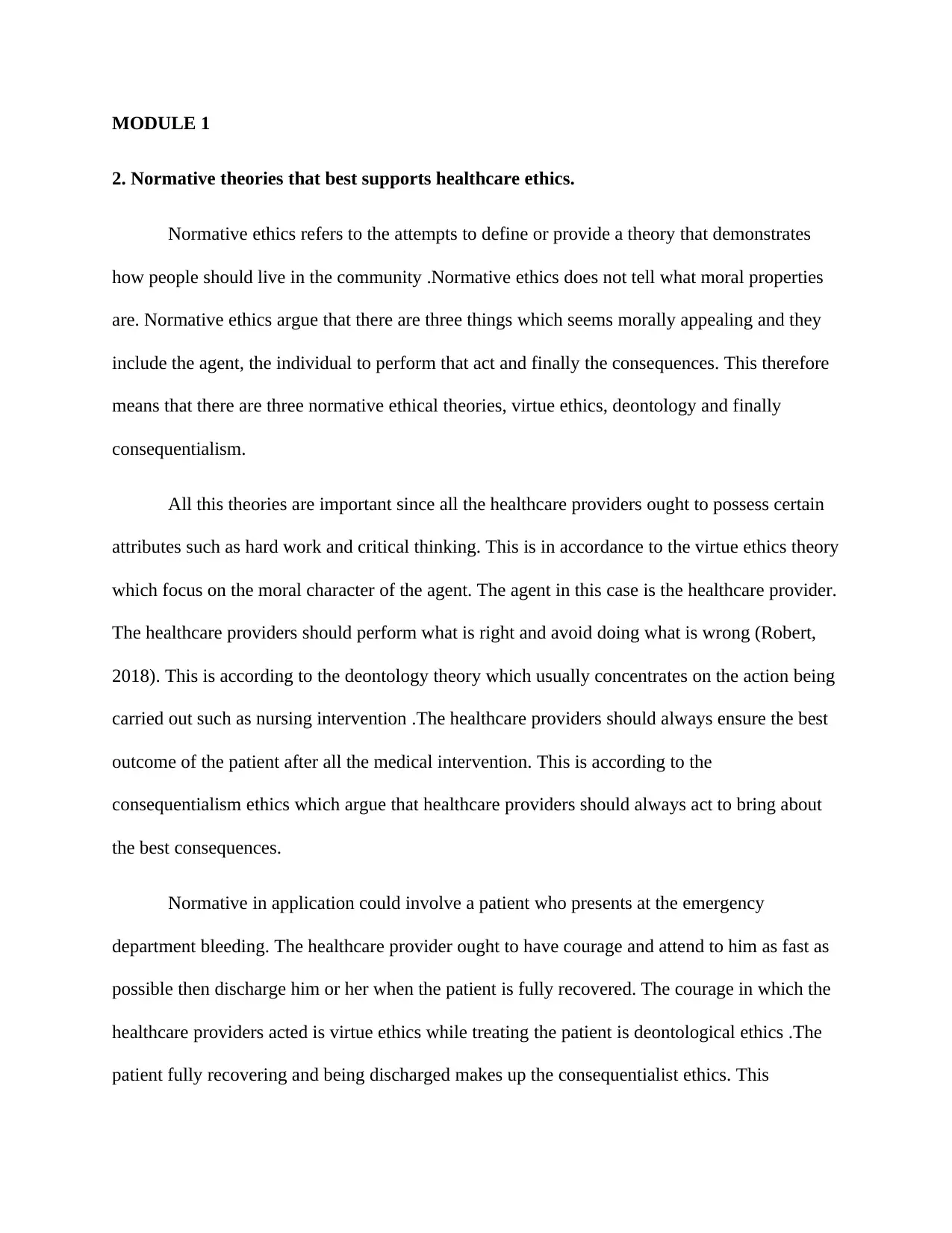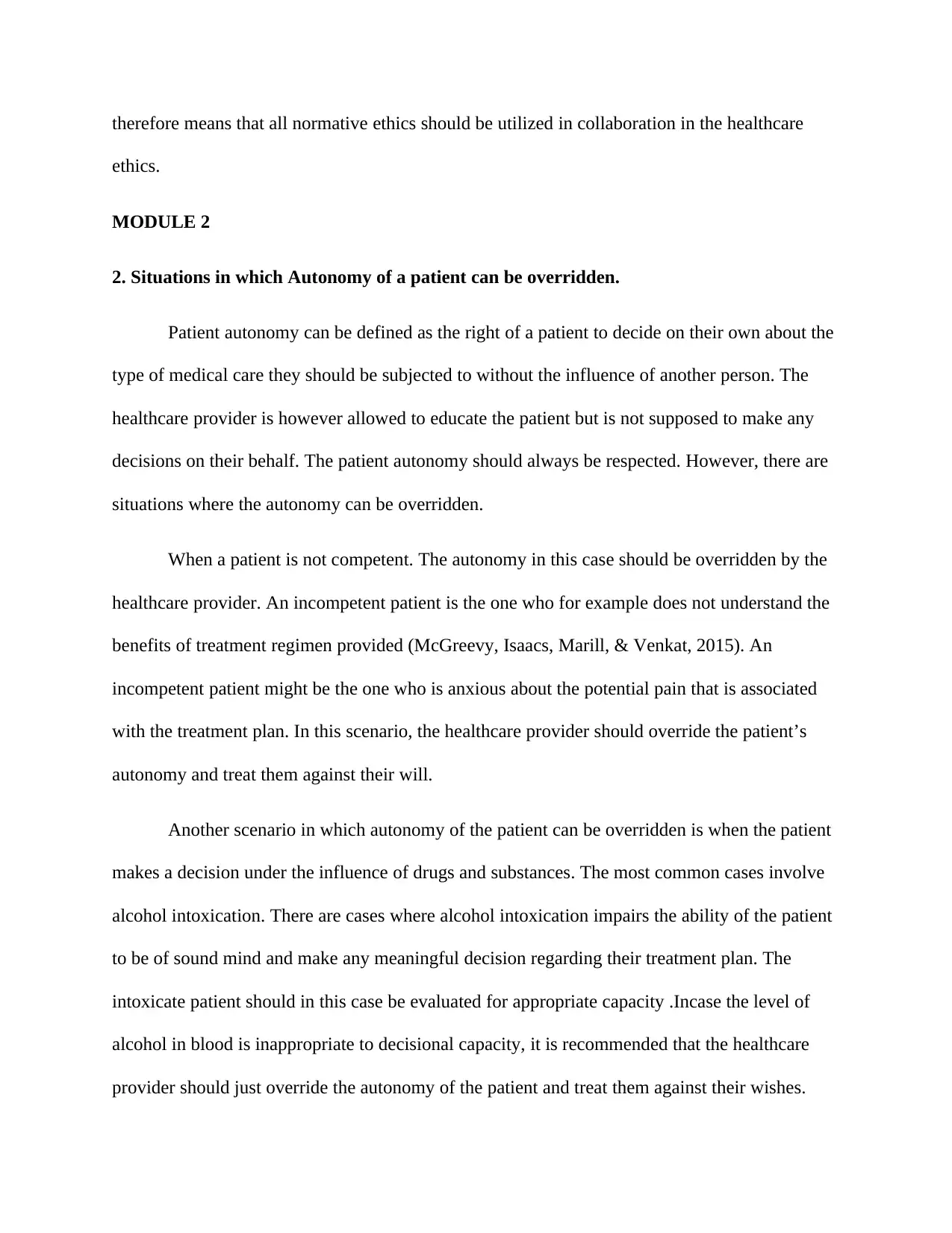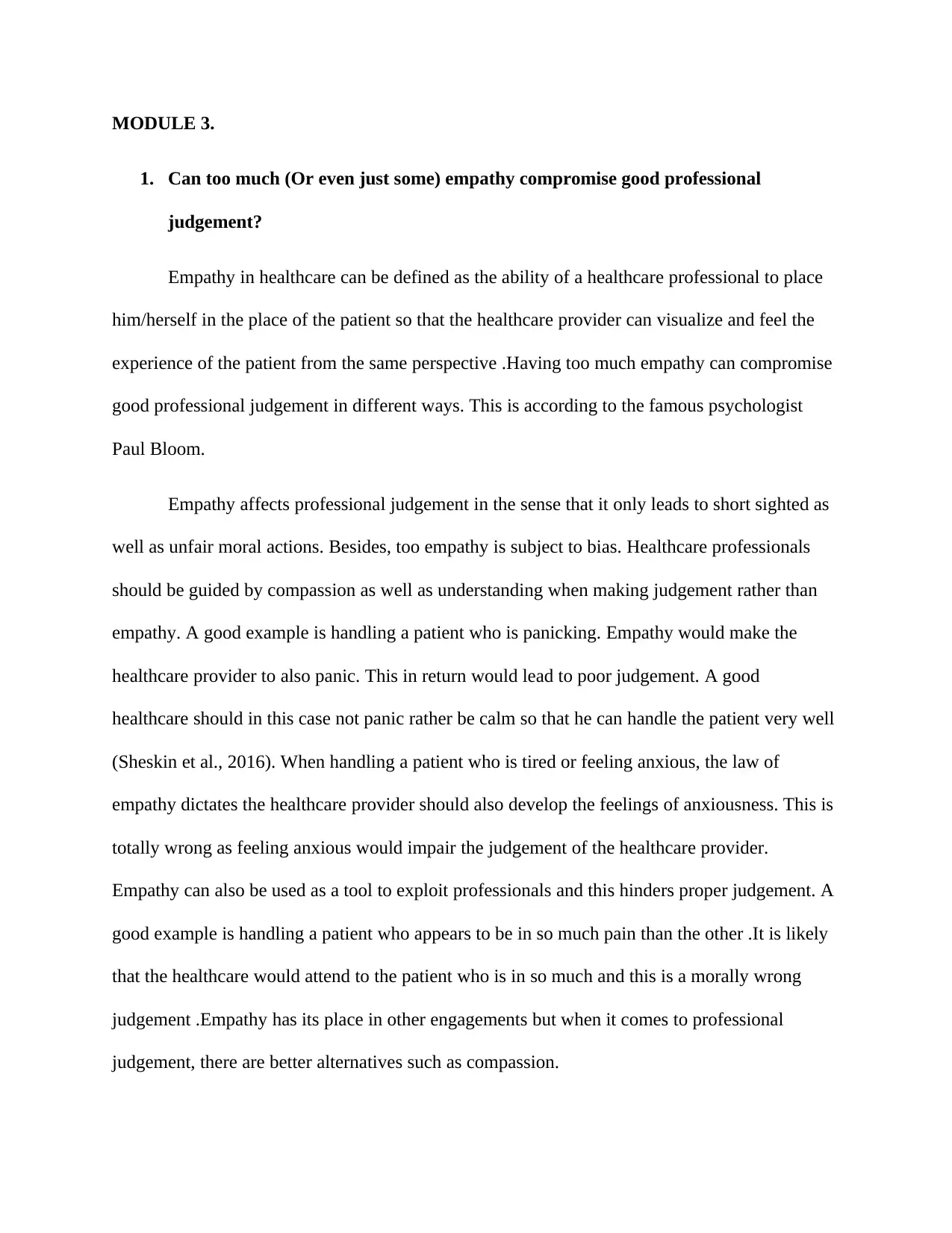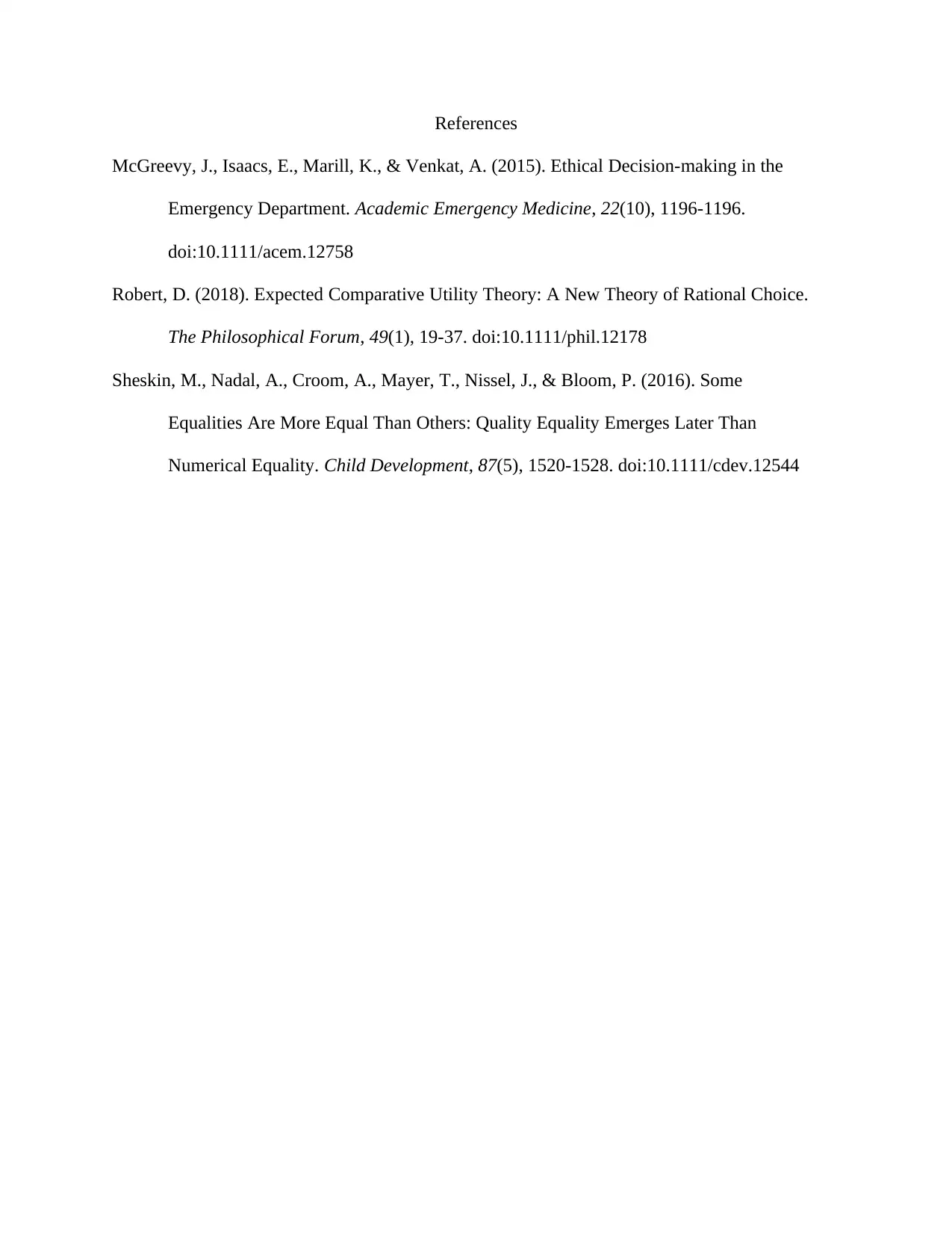Healthcare Ethics Assignment: Modules 1, 2, and 3 Analysis
VerifiedAdded on 2023/06/06
|5
|1066
|396
Homework Assignment
AI Summary
This assignment delves into key aspects of healthcare ethics, covering three modules. Module 1 examines normative ethical theories—virtue ethics, deontology, and consequentialism—and their application in healthcare, emphasizing the attributes healthcare providers should possess. Module 2 explores situations where patient autonomy can be overridden, focusing on instances of patient incompetence, such as when a patient lacks understanding of treatment benefits or is under the influence of drugs. Finally, Module 3 investigates the impact of empathy on professional judgment, discussing how excessive empathy, as argued by Paul Bloom, can lead to short-sighted and biased decisions, advocating for compassion and understanding as better alternatives in healthcare decision-making. The assignment references specific scenarios and provides supporting references for each module.

PART A
1 A
2 A
3 A
4 B
5 B
6 C
7 B
8 D
9 D
10 B
11A
12 B
13 C
14 A
15 C
1 A
2 A
3 A
4 B
5 B
6 C
7 B
8 D
9 D
10 B
11A
12 B
13 C
14 A
15 C
Paraphrase This Document
Need a fresh take? Get an instant paraphrase of this document with our AI Paraphraser

MODULE 1
2. Normative theories that best supports healthcare ethics.
Normative ethics refers to the attempts to define or provide a theory that demonstrates
how people should live in the community .Normative ethics does not tell what moral properties
are. Normative ethics argue that there are three things which seems morally appealing and they
include the agent, the individual to perform that act and finally the consequences. This therefore
means that there are three normative ethical theories, virtue ethics, deontology and finally
consequentialism.
All this theories are important since all the healthcare providers ought to possess certain
attributes such as hard work and critical thinking. This is in accordance to the virtue ethics theory
which focus on the moral character of the agent. The agent in this case is the healthcare provider.
The healthcare providers should perform what is right and avoid doing what is wrong (Robert,
2018). This is according to the deontology theory which usually concentrates on the action being
carried out such as nursing intervention .The healthcare providers should always ensure the best
outcome of the patient after all the medical intervention. This is according to the
consequentialism ethics which argue that healthcare providers should always act to bring about
the best consequences.
Normative in application could involve a patient who presents at the emergency
department bleeding. The healthcare provider ought to have courage and attend to him as fast as
possible then discharge him or her when the patient is fully recovered. The courage in which the
healthcare providers acted is virtue ethics while treating the patient is deontological ethics .The
patient fully recovering and being discharged makes up the consequentialist ethics. This
2. Normative theories that best supports healthcare ethics.
Normative ethics refers to the attempts to define or provide a theory that demonstrates
how people should live in the community .Normative ethics does not tell what moral properties
are. Normative ethics argue that there are three things which seems morally appealing and they
include the agent, the individual to perform that act and finally the consequences. This therefore
means that there are three normative ethical theories, virtue ethics, deontology and finally
consequentialism.
All this theories are important since all the healthcare providers ought to possess certain
attributes such as hard work and critical thinking. This is in accordance to the virtue ethics theory
which focus on the moral character of the agent. The agent in this case is the healthcare provider.
The healthcare providers should perform what is right and avoid doing what is wrong (Robert,
2018). This is according to the deontology theory which usually concentrates on the action being
carried out such as nursing intervention .The healthcare providers should always ensure the best
outcome of the patient after all the medical intervention. This is according to the
consequentialism ethics which argue that healthcare providers should always act to bring about
the best consequences.
Normative in application could involve a patient who presents at the emergency
department bleeding. The healthcare provider ought to have courage and attend to him as fast as
possible then discharge him or her when the patient is fully recovered. The courage in which the
healthcare providers acted is virtue ethics while treating the patient is deontological ethics .The
patient fully recovering and being discharged makes up the consequentialist ethics. This

therefore means that all normative ethics should be utilized in collaboration in the healthcare
ethics.
MODULE 2
2. Situations in which Autonomy of a patient can be overridden.
Patient autonomy can be defined as the right of a patient to decide on their own about the
type of medical care they should be subjected to without the influence of another person. The
healthcare provider is however allowed to educate the patient but is not supposed to make any
decisions on their behalf. The patient autonomy should always be respected. However, there are
situations where the autonomy can be overridden.
When a patient is not competent. The autonomy in this case should be overridden by the
healthcare provider. An incompetent patient is the one who for example does not understand the
benefits of treatment regimen provided (McGreevy, Isaacs, Marill, & Venkat, 2015). An
incompetent patient might be the one who is anxious about the potential pain that is associated
with the treatment plan. In this scenario, the healthcare provider should override the patient’s
autonomy and treat them against their will.
Another scenario in which autonomy of the patient can be overridden is when the patient
makes a decision under the influence of drugs and substances. The most common cases involve
alcohol intoxication. There are cases where alcohol intoxication impairs the ability of the patient
to be of sound mind and make any meaningful decision regarding their treatment plan. The
intoxicate patient should in this case be evaluated for appropriate capacity .Incase the level of
alcohol in blood is inappropriate to decisional capacity, it is recommended that the healthcare
provider should just override the autonomy of the patient and treat them against their wishes.
ethics.
MODULE 2
2. Situations in which Autonomy of a patient can be overridden.
Patient autonomy can be defined as the right of a patient to decide on their own about the
type of medical care they should be subjected to without the influence of another person. The
healthcare provider is however allowed to educate the patient but is not supposed to make any
decisions on their behalf. The patient autonomy should always be respected. However, there are
situations where the autonomy can be overridden.
When a patient is not competent. The autonomy in this case should be overridden by the
healthcare provider. An incompetent patient is the one who for example does not understand the
benefits of treatment regimen provided (McGreevy, Isaacs, Marill, & Venkat, 2015). An
incompetent patient might be the one who is anxious about the potential pain that is associated
with the treatment plan. In this scenario, the healthcare provider should override the patient’s
autonomy and treat them against their will.
Another scenario in which autonomy of the patient can be overridden is when the patient
makes a decision under the influence of drugs and substances. The most common cases involve
alcohol intoxication. There are cases where alcohol intoxication impairs the ability of the patient
to be of sound mind and make any meaningful decision regarding their treatment plan. The
intoxicate patient should in this case be evaluated for appropriate capacity .Incase the level of
alcohol in blood is inappropriate to decisional capacity, it is recommended that the healthcare
provider should just override the autonomy of the patient and treat them against their wishes.
⊘ This is a preview!⊘
Do you want full access?
Subscribe today to unlock all pages.

Trusted by 1+ million students worldwide

MODULE 3.
1. Can too much (Or even just some) empathy compromise good professional
judgement?
Empathy in healthcare can be defined as the ability of a healthcare professional to place
him/herself in the place of the patient so that the healthcare provider can visualize and feel the
experience of the patient from the same perspective .Having too much empathy can compromise
good professional judgement in different ways. This is according to the famous psychologist
Paul Bloom.
Empathy affects professional judgement in the sense that it only leads to short sighted as
well as unfair moral actions. Besides, too empathy is subject to bias. Healthcare professionals
should be guided by compassion as well as understanding when making judgement rather than
empathy. A good example is handling a patient who is panicking. Empathy would make the
healthcare provider to also panic. This in return would lead to poor judgement. A good
healthcare should in this case not panic rather be calm so that he can handle the patient very well
(Sheskin et al., 2016). When handling a patient who is tired or feeling anxious, the law of
empathy dictates the healthcare provider should also develop the feelings of anxiousness. This is
totally wrong as feeling anxious would impair the judgement of the healthcare provider.
Empathy can also be used as a tool to exploit professionals and this hinders proper judgement. A
good example is handling a patient who appears to be in so much pain than the other .It is likely
that the healthcare would attend to the patient who is in so much and this is a morally wrong
judgement .Empathy has its place in other engagements but when it comes to professional
judgement, there are better alternatives such as compassion.
1. Can too much (Or even just some) empathy compromise good professional
judgement?
Empathy in healthcare can be defined as the ability of a healthcare professional to place
him/herself in the place of the patient so that the healthcare provider can visualize and feel the
experience of the patient from the same perspective .Having too much empathy can compromise
good professional judgement in different ways. This is according to the famous psychologist
Paul Bloom.
Empathy affects professional judgement in the sense that it only leads to short sighted as
well as unfair moral actions. Besides, too empathy is subject to bias. Healthcare professionals
should be guided by compassion as well as understanding when making judgement rather than
empathy. A good example is handling a patient who is panicking. Empathy would make the
healthcare provider to also panic. This in return would lead to poor judgement. A good
healthcare should in this case not panic rather be calm so that he can handle the patient very well
(Sheskin et al., 2016). When handling a patient who is tired or feeling anxious, the law of
empathy dictates the healthcare provider should also develop the feelings of anxiousness. This is
totally wrong as feeling anxious would impair the judgement of the healthcare provider.
Empathy can also be used as a tool to exploit professionals and this hinders proper judgement. A
good example is handling a patient who appears to be in so much pain than the other .It is likely
that the healthcare would attend to the patient who is in so much and this is a morally wrong
judgement .Empathy has its place in other engagements but when it comes to professional
judgement, there are better alternatives such as compassion.
Paraphrase This Document
Need a fresh take? Get an instant paraphrase of this document with our AI Paraphraser

References
McGreevy, J., Isaacs, E., Marill, K., & Venkat, A. (2015). Ethical Decision-making in the
Emergency Department. Academic Emergency Medicine, 22(10), 1196-1196.
doi:10.1111/acem.12758
Robert, D. (2018). Expected Comparative Utility Theory: A New Theory of Rational Choice.
The Philosophical Forum, 49(1), 19-37. doi:10.1111/phil.12178
Sheskin, M., Nadal, A., Croom, A., Mayer, T., Nissel, J., & Bloom, P. (2016). Some
Equalities Are More Equal Than Others: Quality Equality Emerges Later Than
Numerical Equality. Child Development, 87(5), 1520-1528. doi:10.1111/cdev.12544
McGreevy, J., Isaacs, E., Marill, K., & Venkat, A. (2015). Ethical Decision-making in the
Emergency Department. Academic Emergency Medicine, 22(10), 1196-1196.
doi:10.1111/acem.12758
Robert, D. (2018). Expected Comparative Utility Theory: A New Theory of Rational Choice.
The Philosophical Forum, 49(1), 19-37. doi:10.1111/phil.12178
Sheskin, M., Nadal, A., Croom, A., Mayer, T., Nissel, J., & Bloom, P. (2016). Some
Equalities Are More Equal Than Others: Quality Equality Emerges Later Than
Numerical Equality. Child Development, 87(5), 1520-1528. doi:10.1111/cdev.12544
1 out of 5
Related Documents
Your All-in-One AI-Powered Toolkit for Academic Success.
+13062052269
info@desklib.com
Available 24*7 on WhatsApp / Email
![[object Object]](/_next/static/media/star-bottom.7253800d.svg)
Unlock your academic potential
Copyright © 2020–2025 A2Z Services. All Rights Reserved. Developed and managed by ZUCOL.



